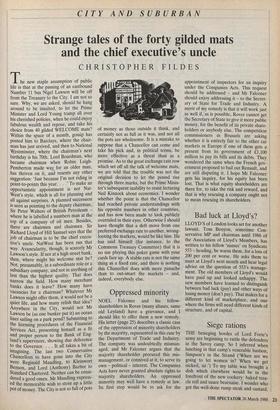Oppressed minority
NOEL Falconer and his fellow- shareholders in Rover (many aliases, same old Leyland) have a grievance, and I should like to offer them a new remedy. His letter (page 25) describes a classic case of the oppression of minority shareholders by the majority, represented in this case by the Department of Trade and Industry. The company was undoubtedly misman- aged, and Mr Falconer argues that the majority shareholder• procured this mis- management, or connived at it, to serve its own — political — interest. The Companies Acts have never granted absolute rights to majority shareholders. An oppressed minority may well have a remedy at law. Its first step would be to ask for the appointment of inspectors for an inquiry under the Companies Acts. This request should be addressed — and Mr Falconer should enjoy addressing it — to the Secret- ary of State for Trade and Industry. A merit of my remedy is that it will work just as well if, as is possible, Rover cannot get the Secretary of State to give it more public money, for the benefit of its private share- holders or anybody else. The competition commissioners in Brussels are asking whether it is entirely fair to the other car markets in Europe if one of them gets a present from its government of £3,100 million to pay its bills and its debts. They wondered the same when the French gov- ernment proposed to bail out Renault, and are still disputing it. I hope Mr Falconer gets his inquiry, for his equity has been lost. That is what equity shareholders are there for, to take the risk and reward, and that is why rescuing a company ought not to mean rescuing its shareholders.


















































 Previous page
Previous page